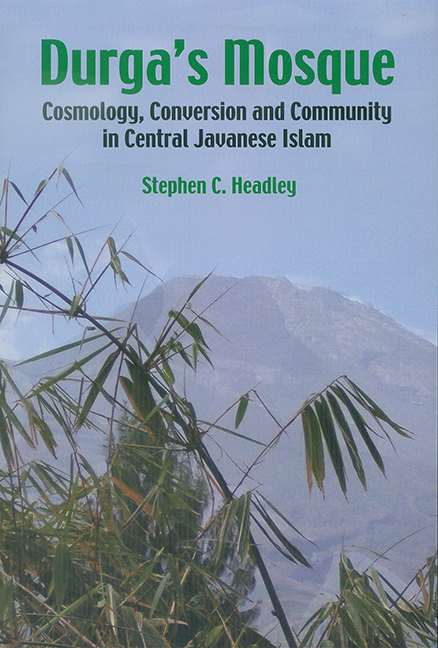Book contents
- Frontmatter
- Contents
- List of Figures
- List of Tables
- Preface
- Acknowledgements
- Introduction: Cosmology, Conversion and Community in Javanese Islam
- PART I THE SOCIOLOGY AND PRACTICE OF RELIGION IN CENTRAL JAVA
- PART II RECONSTRUCTION OF LOCAL RELIGIOUS HISTORY
- PART III INVOKING THE COSMOS, MAGNIFYING ALLAH: STRUCTURING A LANDSCAPE IN THE SEVENTEENTH TO NINETEENTH CENTURIES
- PART IV COSMOLOGY, CONVERSION AND COMMUNITY IN CENTRAL JAVANESE ISLAM TODAY
- 12 Jihad in Java: An Islamic Appropriation of Individualism
- 13 Of Sacred Wells and Shopping Malls: Glimpses of the Reconstruction of Social Confidence in Solo after Soeharto
- 14 The Social Reconstruction of Confidence: Community and Islam in Surakarta Today
- 15 Enclosing Cosmologies and Elective Citizenship
- Bibliography
- Index
- About the Author
12 - Jihad in Java: An Islamic Appropriation of Individualism
from PART IV - COSMOLOGY, CONVERSION AND COMMUNITY IN CENTRAL JAVANESE ISLAM TODAY
Published online by Cambridge University Press: 21 October 2015
- Frontmatter
- Contents
- List of Figures
- List of Tables
- Preface
- Acknowledgements
- Introduction: Cosmology, Conversion and Community in Javanese Islam
- PART I THE SOCIOLOGY AND PRACTICE OF RELIGION IN CENTRAL JAVA
- PART II RECONSTRUCTION OF LOCAL RELIGIOUS HISTORY
- PART III INVOKING THE COSMOS, MAGNIFYING ALLAH: STRUCTURING A LANDSCAPE IN THE SEVENTEENTH TO NINETEENTH CENTURIES
- PART IV COSMOLOGY, CONVERSION AND COMMUNITY IN CENTRAL JAVANESE ISLAM TODAY
- 12 Jihad in Java: An Islamic Appropriation of Individualism
- 13 Of Sacred Wells and Shopping Malls: Glimpses of the Reconstruction of Social Confidence in Solo after Soeharto
- 14 The Social Reconstruction of Confidence: Community and Islam in Surakarta Today
- 15 Enclosing Cosmologies and Elective Citizenship
- Bibliography
- Index
- About the Author
Summary
If the coherence of a representation resides in bringing together its elements in the order of their meaning, jihad in contemporary Java can be analysed as three successive processes. Jihad enables Javanese Muslims to: (1) reinvent Islam in Indonesia as the umat writ large; (2) face down the secularizing state; and (3) confront the growth of individualism promoted by statecentred nationalism. Nevertheless, these jihad campaigns fail to convince many Javanese Muslims that they fully represent Islam. For the unconvinced, Islam is already that whole which allows Indonesians to think through all of Javanese society, and so by definition Islam peacefully cohabits with all that is “other” in Java.
Here is an example of the difficulties of thinking of Java as a whole. The major conservative Javanese Muslim party, the Nahdlatul Ulama (NU) in its July 2002 congress in Jakarta (25–28 July 2002), defended suicide bombing as a legitimate weapon to defend Islam. But at the same time it moderated that stance, insisting that it was necessary to prepare students to face relativism in ways other than monolithic rejection of alien opinions: the study of the Koran and hadith, the study of Islamic jurisprudence (fikh). These two positions were not irreconcilable. Calls for jihad are barometers of storms concerning alterity in a socially disintegrating Java. To combat this disintegration, many Javanese Muslims perceive an advantage in coexisting with contemporary non-believers (kafir). The opposite strategy for dealing with this social fragmentation is jihad, which imagines Java as a seamless Islamic whole and attempts to represent, to render present (prae esse), Islam as an exclusive totality, thus condemning the non-Islamic margins of Java.
What is the value of tolerance? In this less combative perspective, it appreciates the value of difference (ikhtilāf), used by some Muslims trying to create inclusive visions of their relation with other Javanese. Difference is thought of as an inherent dimension of society, consolidating their own community or umat. There is more to the Islamization of Javanese society than a militant communalism treating other religions as foreign to Javanese society. An Islamic current is trying to “civil”-ize the multi-confessional Javanese society through a religious encompassing. This is possible to the extent that all confess Allah, the standard word all Javanese use for God.
- Type
- Chapter
- Information
- Durga's MosqueCosmology, Conversion and Community in Central Javanese Islam, pp. 425 - 452Publisher: ISEAS–Yusof Ishak InstitutePrint publication year: 2004

